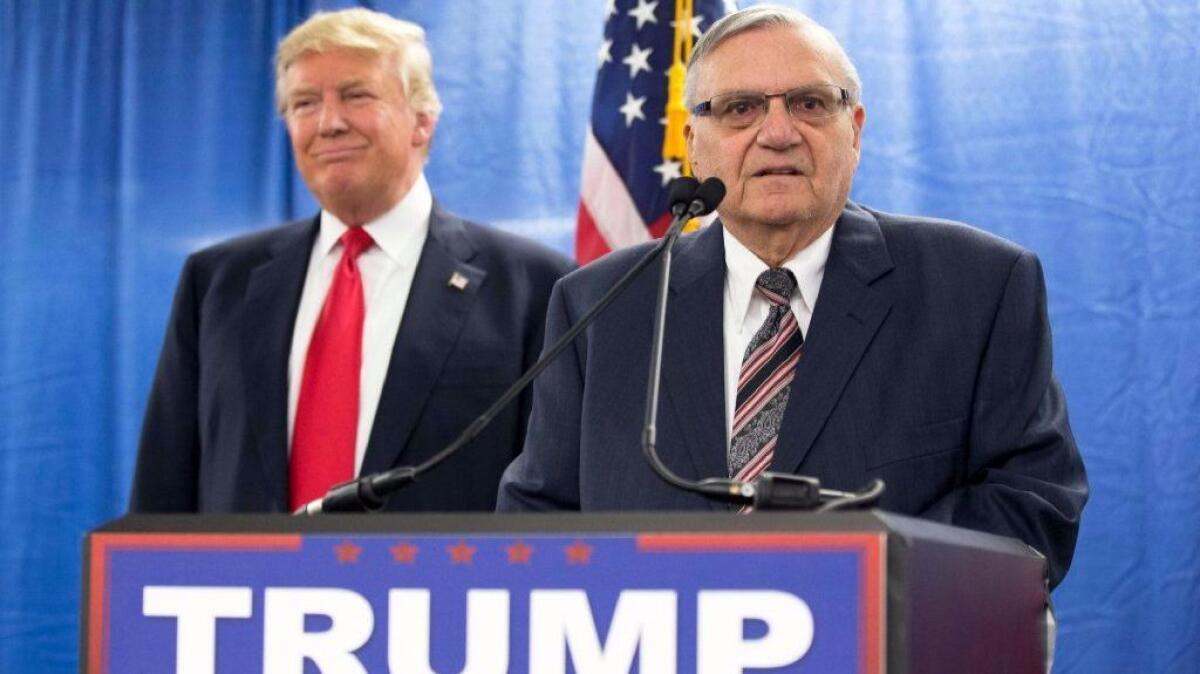Op-Ed: Joe Arpaio’s pardon defended by a ‘whataboutism’ that doesn’t hold up

It was difficult late Friday into Saturday to find anyone willing to defend President Trump’s decision to pardon Joe Arpaio before a federal judge sentenced the disgraced former Arizona sheriff for criminal contempt. Some tried. Some compared the pardon to President Obama’s commutation of the federal sentence of Chelsea Manning, or of hundreds of nonviolent drug offenders. That these lame efforts in “whataboutism” were the best arguments supporting the pardon tell you how indefensible it actually was.
Even if we stipulate that a president’s pardon power is absolute, the justifications offered by the White House are risible. That Arpaio devoted his life to “protecting the public from the scourges of crime and illegal immigration” surely comes as news to those Maricopa County residents who were the victims of sex crimes that weren’t adequately investigated by Arpaio’s deputies. And it comes as news to those victimized by the intentional racial discrimination Arpaio orchestrated against Latino residents.
The truth is that “America’s toughest sheriff,” as Arpaio liked to call himself, was an incompetent buffoon, a sour mash of cruelty and inattention that cost his county hundreds of millions of dollars in fines, fees and legal settlements. The only thing he accomplished in his decades in power was to become, first, a national symbol of brutality toward jail inmates and, later, a poster child for anti-immigrant racism. But pardon decrees cannot say any of that. They cannot say: “Because no one can stop us we are today rescuing a sheriff who violated his oath of office and broke the law and never apologized for doing so.”
Trump’s pardon makes sense only as a raw act of self-perpetuating power designed to give succor to those caught in the middle of the investigation into the Trump team’s ties to Russia, and to encourage other lawless law officers to ignore those court orders with which they disagree.
There isn’t much left to say, except to clarify the difference between the executive action taken Friday by Trump, a full pardon, and the controversial commutations undertaken during the Obama administration.
From the Justice Department’s website: “A pardon is an expression of the President’s forgiveness and ordinarily is granted in recognition of the applicant’s acceptance of responsibility for the crime and established good conduct for a significant period of time after conviction or completion of sentence.”
Makes sense, except Arpaio never accepted responsibility for his criminal conduct and he never demonstrated a speck of remorse for violating his oath of office so he could continue to discriminate against Latino residents. Nor, of course, did Trump wait for the courts to sentence Arpaio or for Arpaio to serve even a small fraction of a sentence. By the Justice Department’s own terms this was an extraordinary exercise of the president’s power.
A commutation, on the other hand, “reduces a sentence, either totally or partially, that is then being served, but it does not change the fact of conviction, imply innocence, or remove civil disabilities that apply to the convicted person as a result of the criminal conviction.”
Unlike Arpaio, the men and women to whom Obama showed mercy all had served significant time in federal prisons before they sought clemency. (Manning, for instance, ultimately served seven years.) Unlike Arpaio, each accepted responsibility for the crime or crimes that had put them behind bars. Unlike Arpaio, each went through a laborious vetting process by the Justice Department to ensure that the relief that ultimately was granted could be justified.
In the case of Arpaio, by contrast, the Justice Department meekly accepted Trump’s pardon late Friday without so much as a peep from the attorney general (an attorney general who railed against Obama’s clemency orders). There is no reason to think there was a thorough review of Arpaio’s situation at the White House counsel’s office. Is the attorney general ever going to explain how pardoning a peace officer who broke the law fits into the Justice Department’s push to restore “integrity” to the rule of law?
There is one more difference between what Trump has just done and what Obama did. Obama granted mercy not just to high-profile inmate Manning, but to ordinary men and women who committed ordinary crimes. Trump granted mercy to a man who swore an oath and then put himself above the law in the most fundamental way possible—by refusing to enforce the law as the courts had interpreted it. In Trump’s world that is celebrated as “public service.” In the real world we call that criminal contempt.
Andrew Cohen is senior editor at The Marshall Project, a fellow at the Brennan Center for Justice and a senior legal analyst at CBS News Radio.
Follow the Opinion section on Twitter @latimesopinion or Facebook
More to Read
A cure for the common opinion
Get thought-provoking perspectives with our weekly newsletter.
You may occasionally receive promotional content from the Los Angeles Times.










